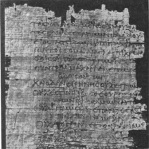From Psalms 51-57
 The opening line of the Psalm is confronting! Especially towards those who claim there is no God. Is this something God’s people should say to all unbelievers? Or is there more to it? Read on to see why the Psalmist takes such a strong stand against people who say such things.
The opening line of the Psalm is confronting! Especially towards those who claim there is no God. Is this something God’s people should say to all unbelievers? Or is there more to it? Read on to see why the Psalmist takes such a strong stand against people who say such things.
This post is part of my bible in a year series.
Passage and Comments
We will soon see the Psalm focuses on foreigners who are encamped against Israel (v5). The Psalm is a judgment on Israel’s enemies, a taunt the LORD will defeat them and a hope the LORD will act to restore his people.
1 The fool says in his heart, “There is no God.” They are corrupt, doing abominable iniquity; there is none who does good.
2 God looks down from heaven on the children of man to see if there are any who understand, who seek after God.
3 They have all fallen away; together they have become corrupt; there is none who does good, not even one. (Ps 53.1-3)
The Psalmist speaks about ‘the fool’ and refers to a group of people. The transliteration of the underlying Hebrew is ‘nabal’ (cf. 1 Sam 25.3).
“Generally, a nabal is a person whose behavior is disruptive and disintegrative of family, community, and nation. It is worthwhile to note that in Ps 53, the “evildoers” are linked with the nabal, whose behavior is so vile, corrupt, and destructive. The fools formulate their judgments in their hearts (or minds). They may not speak of their decisions with their lips, but they act out of the volitional center of their lives.” (Tate, M.E., 1998. Psalms 51–100, Dallas: Word, Incorporated.)
The fool is described in terms of his being. He is corrupt.
The fool is described in terms of his knowledge. They do not understand or seek after God.
The fool is described in terms of his actions. They perform abomination and iniquity. They do not do good.
God looks down on them and is not impressed.
4 Have those who work evil no knowledge, who eat up my people as they eat bread, and do not call upon God?
5 There they are, in great terror, where there is no terror! For God scatters the bones of him who encamps against you; you put them to shame, for God has rejected them. (Ps 53.4-5)
The ‘fools’ are those who ‘eat up’ the LORD’s people. God’s people are persecuted by them. A basic contrast is drawn between the two groups of people. The fools do not ‘call upon God’. They do not respect him or his authority.
There are consequences for thinking and acting like a fool. Terror and shame.
The LORD will oppose people who think and behave like this. To fall into the hand of an angry God is not a pleasant experience.
‘Encamps against you’. The Psalmist assumes a close link between God and his people. Israel is under some sort of siege. But it is the LORD these enemies encamp against.
6 Oh, that salvation for Israel would come out of Zion! When God restores the fortunes of his people, let Jacob rejoice, let Israel be glad. (Ps 53.6)
The Psalmist finishes expressing the hope the LORD will save his people from their enemies and restore their fortunes. More specifically, that their salvation ‘would come out of Zion’.
Story of Israel

Psalm 53 and Psalm 14 are virtually identical with a few exceptions.
Ps 14 concentrates on God’s relationship with the righteous. God protects the poor. The fools are those inside Israel. Masquerading as God’s people they do not acknowledge the LORD or seek to come under his rule.
Ps 53 says more about God’s wrath on the ungodly. God will scatter the bones of the ungodly. Israel was many times (due to her own sin) invaded by enemies who sought to take them over. The Psalmist today call these foreign invaders fools as well.
Story of Jesus
Jesus preached a parable where God called someone a fool.
13 Someone in the crowd said to him, “Teacher, tell my brother to divide the inheritance with me.” 14 But he said to him, “Man, who made me a judge or arbitrator over you?” 15 And he said to them, “Take care, and be on your guard against all covetousness, for one’s life does not consist in the abundance of his possessions.”
16 And he told them a parable, saying, “The land of a rich man produced plentifully, 17 and he thought to himself, ‘What shall I do, for I have nowhere to store my crops?’ 18 And he said, ‘I will do this: I will tear down my barns and build larger ones, and there I will store all my grain and my goods. 19 And I will say to my soul, “Soul, you have ample goods laid up for many years; relax, eat, drink, be merry.” ’
20 But God said to him, ‘Fool! This night your soul is required of you, and the things you have prepared, whose will they be?’ 21 So is the one who lays up treasure for himself and is not rich toward God.” (Lk 12.13-21)
Psalm 53 is a comfort and a warning.
Comfort. Are you being persecuted by fools? It may be comforting to know just how strongly the LORD opposes those who persecute and oppress his people.
Warning. Are you the fool? The Psalm tells us about the dangers of being foolish. Keep seeking God and make sure your most valuable treasure is in him.
Copyright © Joshua Washington and thescripturesays, 2016. All Rights Reserved.




